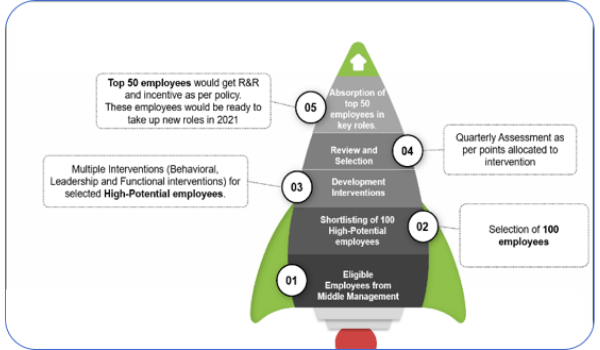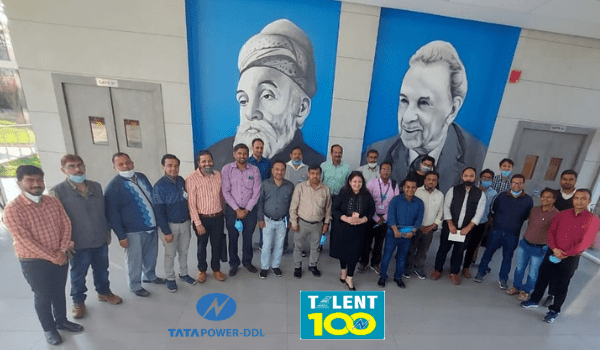In December 2020, Tata Power launched a leadership development programme, ‘Talent 100’ under which it pledged to give 100 leaders to the Company every year.
The company has shortlisted its 100 future leaders on the basis of analytical and critical thinking, developing and managing networks, managing change, as well as skills of managerial communication and emotional intelligence.
These 100 shortlisted employees are undergoing a 9 to 12-month long training and development process. Out of these 100, only 50 will get promoted to higher roles this year.
The programme is conceived by the training and development team of the organisation, is executed under the guidance of its senior leaders. Ganesh Srinivasan, CEO and leadership team of TPDDL are personally involved and also conduct sessions to build expertise in participants and provide required mentoring.
 This programme is essentially conceived for mid-level management employees who will be selected on the basis of their ratings and performance. The programme is also open to B-rated employees as the Company wants to ensure diversity of thoughts at leadership levels.
This programme is essentially conceived for mid-level management employees who will be selected on the basis of their ratings and performance. The programme is also open to B-rated employees as the Company wants to ensure diversity of thoughts at leadership levels.
According to the current roles and behavioural competencies of the participants of the programme, the firm has developed future roles for them. This has been done in consultation with the managers and the employees themselves.
On completion of the programme, participants can choose to go into any future role of their choice. “Employees are welcome to change their field, if they so wish,” shares Subir Verma, head – HR, Tata Power DDL.
The development process has a mix of coaching and training sessions, e-learning modules and projects.
“Participants I have interacted with have given great feedback for this programme, because they see tangible outcomes in terms of learning and growth.”
Subir Verma, head – HR, Tata Power DDL
Senior leaders in the organisation, including Verma himself, conduct coaching and training sessions. Other industry coaches and trainers are also brought in to conduct sessions for the participants.
Apart from this, the Company has organised power speaking sessions, which are conducted by diverse sets of business leaders, such as Kunal Shah, founder, Cred; Sunil Mathur, CEO, Seimens India; Sandeep Bhatnagar, MD, Accenture India and others.
“These sessions have given diverse perspectives to the participants, have made them aware of what is happening outside their industry and learn from these,” shares Verma.
“We follow a 70-20-10 model of training and development where in theoretical knowledge was given through e-learning and blended training programs, interactions with senior management and industry experts were organised so that employees can learn from experiences of industry leaders as well,” he adds.
Procedure
Its’ not a one way (top down) approach where in HR-Talent Development decides the interventions for employees, but a two way approach where employees chose the areas in which they want to improve and grow. All employees shared their career aspirations, training needs which were assessed by Talent Development team. On the basis of analysis; customised learning interventions were designed, some of the needs were covered through classroom training programs and some are covered through action learning projects.
The whole journey is gamified to create a sense of healthy competition among the participants. On successful and timely completion of learning intervention, participants are awarded with points and based on accumulated points, a scorecard is created for each participant. The participants are ranked basis their performance in Talent 100 journey which encourages them to participate in the process enthusiastically.
The participants are expected to go through e-learning modules and also submit cross-functional projects. It is mandatory for participants to do a project in a field other than the one they come from. The topics or subjects for these individual cross-functional projects are chosen by the participants themselves.
Additionally, all the participants have to submit one project each covering CSR, innovation, business as well as safety.
The training and development interventions aim to give the participants product knowledge and behavioural competencies that are characteristic of leaders.
All of the afore-mentioned learning interventions carry some points, and the participants are assessed, evaluated and then marked accordingly.
Training interventions carry 50 points, while coaching carries 100 points — divided into attendance (carrying 25 points) and mentor feedback (carrying 75 points).
E-learning carries 50 points and cross-functional projects carry 100 points, with equal weightage given to timely submission and quality.
The CSR project is worth 50 points, while the innovation one carries 100 points and the safety project carries 50.
To ensure transparency, the firm maintains a leaderboard, where the results, with rankings, are displayed for all to see.
Apart from the promotions the chosen 50 will get, participants of this programme will also receive financial rewards. The first 25 people in the ranking will get 100 per cent variable of one month as financial reward and the remaining will get 50 per cent variable of one month.
“Participants I have interacted with have given great feedback for this programme, because they see tangible outcomes in terms of learning and growth,” explains Verma.
A panel of senior leaders, including the CEO, will perform a quarterly assessment.
According to Verma, Tata Power is growing rapidly and its distribution facility in Orissa requires a new set of leaders. The Company feels quite prepared to meet the demand, as it has already promoted six to seven people till now, and within a period of nine to 12 months a total of 50 will be promoted.
What happens to the rest of the 50 participants who are part of this programme? Verma explains that while the Company did not want to make an overwhelming commitment in the beginning, the fact remains that it will anyway require 100 skilled leaders in the future.
As per the current status, behavioural and leadership interventions are underway. The cross-functional projects have already been assigned to participants and soon CSR projects will also be allocated.
At the end of the programme, Tata Power DDL will be ready with 100 capable leaders, 50 of whom are already in their future leadership positions.



